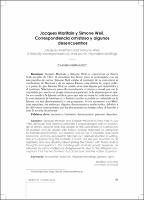Por favor, use este identificador para citar o enlazar este ítem:
https://repositorio.usj.es/handle/123456789/1041
Registro completo de metadatos
| Campo DC | Valor | Lengua/Idioma |
|---|---|---|
| dc.contributor.author | Herrando, Carmen | - |
| dc.date.accessioned | 2024-01-19T09:34:25Z | - |
| dc.date.available | 2024-01-19T09:34:25Z | - |
| dc.date.issued | 2022-10-24 | - |
| dc.identifier.citation | Carmen Herrando, “Jacques Maritain y Simone Weil. Correspondencia amistosa y algunos desencuentros”, Quién. Revista de filosofía personalista, nº 17 (2023), pp. 45-63. | en_US |
| dc.identifier.issn | 2443-972X | en_US |
| dc.identifier.uri | https://repositorio.usj.es/handle/123456789/1041 | - |
| dc.description | Jacques Maritain and Simone Weil met in New York in July 1942. Although their meeting was brief, it was prolonged with an exchange of letters. Simone Weil was aware of the conversion to Catholicism of Maritain and his Jewish wife Raïssa. Simone Weil had no attraction to Aristotle and Thomism, but Maritain was for her a Christian and moral reference, and she exposed to him her own spiritual situation in writing. She was approaching the Catholic Church, but she was reluctant to be baptized, and very doubtful about joining the Church with those kinds of thoughts and questions. This meeting with Maritain would, however, be followed by some intellectual disagreements, due to the different conceptions that the two thinkers had about Law and the notion of person. | en_US |
| dc.description.abstract | Jacques Maritain y Simone Weil se conocieron en Nueva York en julio de 1942; el encuentro fue breve, pero se prolongaría con un intercambio de cartas. Simone Weil estaba al corriente de la conversión al catolicismo de Maritain y de su esposa Raïssa, esta última de origen judío, y, a pesar de que Simone Weil no sentía atracción alguna por Aristóteles y el tomismo, Maritain era para ella un referente cristiano y moral; por eso le expondría por escrito su propia situación espiritual, la de alguien que se estaba acercando a la Iglesia católica, pero que aún no tenía luz suficiente sobre la conveniencia de bautizarse, y dudaba mucho si podría ser admitida en la Iglesia con sus planteamientos y sus preguntas. A este encuentro con Maritain seguirían, sin embargo, algunos desencuentros intelectuales, debidos a las diferentes concepciones que los dos pensadores tenían sobre el derecho y ante la noción de persona. | en_US |
| dc.format.extent | 19 p. | en_US |
| dc.format.mimetype | application/pdf | en_US |
| dc.language.iso | spa | en_US |
| dc.publisher | Asociación Española de Personalismo | en_US |
| dc.relation.requires | Adobe | en_US |
| dc.rights | Attribution-NonCommercial-NoDerivatives 4.0 Internacional | * |
| dc.rights.uri | http://creativecommons.org/licenses/by-nc-nd/4.0/ | * |
| dc.subject | Encuentro | en_US |
| dc.subject | Bautismo | en_US |
| dc.subject | Desencuentro | en_US |
| dc.subject | Persona | en_US |
| dc.subject | Derechos. | en_US |
| dc.subject | Encounter | en_US |
| dc.subject | Baptism | en_US |
| dc.subject | Misunderstandings | en_US |
| dc.subject | Person | en_US |
| dc.subject | Rights. | en_US |
| dc.title | Jacques Maritain y Simone Weil. Correspondencia amistosa y algunos desencuentros | en_US |
| dc.title.alternative | Jacques Maritain and Simone Weil. A friendly correspondence and some misunderstandings | en_US |
| dc.type | journal article | es_ES |
| dc.identifier.publicationfirstpage | 45 | en_US |
| dc.identifier.publicationlastpage | 63 | en_US |
| dc.rights.accessRights | open access | es_ES |
| Aparece en las colecciones: | Artículos de revistas | |
Ficheros en este ítem:
| Fichero | Descripción | Tamaño | Formato | |
|---|---|---|---|---|
| Jacques Maritain_QUIEN_Num 17.pdf | 702,87 kB | Adobe PDF |  Visualizar/Abrir |
Este ítem está sujeto a una licencia Creative Commons Licencia Creative Commons

